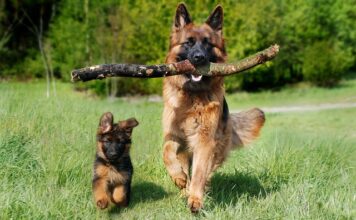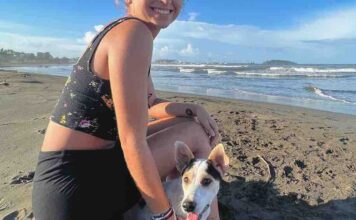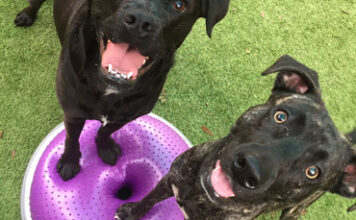Beach season is officially over and while Charleston is fortunate enough to have comparatively mild winters, temperatures can and do drop during this time of year. Here’s what you need to know in order to ensure that your pet is best taken care of for these cold months ahead.
First and foremost, it’s a good idea to have your pet visit their veterinarian before the cool weather sets in. Pets should see their veterinarian once a year for an annual health check-up, so it’s as good a time as any to schedule their visit. Identifying any underlying health issues or monitoring the status of pre-existing conditions is important before the winter season, as colder temperatures can make your pet more susceptible to health risks and exasperate current health issues. Arthritic or elderly pets can especially have trouble navigating cold weather and puppies can be more susceptible to risk as well. Additionally, dogs with diabetes, heart disease, kidney disease, or hormonal imbalances, such as Cushing’s disease, may have more difficulty regulating their body temperature.
Your dog’s diet may need some adjusting during the winter months, as well. If your dog engages in outdoor activities, they may need an increase in food to make up for the extra energy burned to keep warm. Alternatively, if your dog spends more time inside during the winter and/or napping to preserve energy, you may need to decrease their food intake. Some owners think that “a little extra” weight will be helpful during the winter months; however, the health risks associated with those extra pounds outweigh the benefits. As always, talk with your pet’s healthcare provider about how to best manage their health and wellness over the winter.
It is also important to monitor your pet’s tolerance to the cold. Just like people, some dogs get cold more easily than others. Check for signs of discomfort, such as whining, shivering, anxiety, slowing or stopping of movement, or if they begin looking for warm places to burrow. These are all signs that your pet needs to go back inside. Dogs with shorter coats may need a sweater or jacket for extra protection. Dogs lose most of their body heat from the pads of their feet, ears, and respiratory tract and dogs closer to the ground tend to get cold more easily.
Watch for signs of hypothermia through symptoms of shivering, depression, lethargy, and weakness. Make sure to warm your pup up if they are exhibiting any of these signs by bringing them inside, wrapping them with blankets, and possibly using a wrapped, hot water bottle. If your pet does not show improvement, call your veterinarian. Frostbite can also be a concern during extreme cold and typically affects the dog’s tail, ears, or paws. Frostbite can be more tricky to detect as there may be no immediate or obvious signs; it can take several days for the tissue to show signs of damage. If you suspect that your pup may have frostbite, bring them inside and warm them up similarly to if they were hypothermic. It is important that you do NOT rub the suspected frostbitten areas as this will cause damage to the tissue. Once again, call your veterinarian if you believe that your dog may be suffering from frostbite.
A good preventative measure is to wipe your dog’s paws and stomach down after coming inside in icy or wet conditions. Not only may the paw pads become irritated, but they can also pick up any salt, deicers, antifreeze, or other chemicals that may be used during the winter months. Dogs will lick themselves clean and can ingest these toxins; even a small amount of antifreeze can be lethal and salt can cause inflammation of their digestive tract. Make sure to check the areas your pet has access to for potential spills as well.
It is also extremely important to monitor your dog’s water source; dogs should always have access to fresh water. If their only water source is frozen, your dog may try to drink from puddles or gutters that may be polluted with oil, antifreeze, household cleaners, or other chemicals.
Your pup should also have access to shelter if they’re going to be outside for long periods of time. The structure should be solid with the floor off of the ground to minimize heat loss. Bedding should be thick, dry, and changed regularly and the door to the shelter should face away from prevailing winds. While you may want to provide your pet with heat, stay away from heat lamps and space heaters as they can cause burns and be a fire-risk. Heated pads should also be used with caution as they may also burn your pet.
Likewise, if your pet is indoors, make sure that your home is pet-proofed. Pups can not only burn themselves on space heaters, but they can also knock them over and cause potential fire hazards. Additionally, your pet may seek warmth from a fire, pellet stove, etc. which could lead to burns and once again, pose a potential fire hazard. Make sure that your pet does not come into contact with any flames, heating coils, or hot surfaces. Having your furnace checked before the winter months is also crucial to make sure that it is functioning properly and not emitting carbon monoxide. Installing carbon monoxide detectors in your home as a secondary precaution is good back-up, too. If your dog is an inside dog, they tend to spend more time in the house than you do, so make sure they are protected!
Finally, if you decide to bring your pup somewhere with you, remember that a cold car can be just as dangerous as a hot car. Do not leave your pup in the car during cold weather as the temperature can drop rapidly and your car can become a refrigerator. Furthermore, make sure to check around and under your car before starting it, as cats and dogs often think that cars are a good place to seek shelter and warmth from.
As always, the best preventative measure is knowing your dog. Observe their normal behavior and natural tendencies so you can distinguish anything out of the ordinary. Remember that your pup is affected by these colder temperatures just as you are. Here is a link to a more condensed checklist of tips for navigating the winter season safely. Stay warm!







